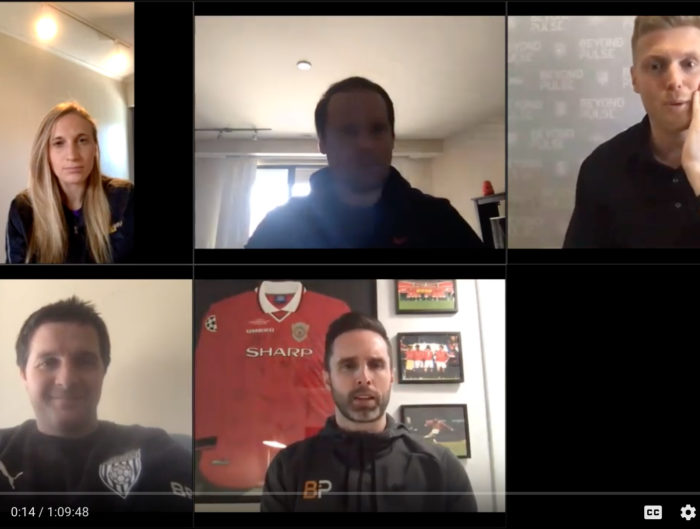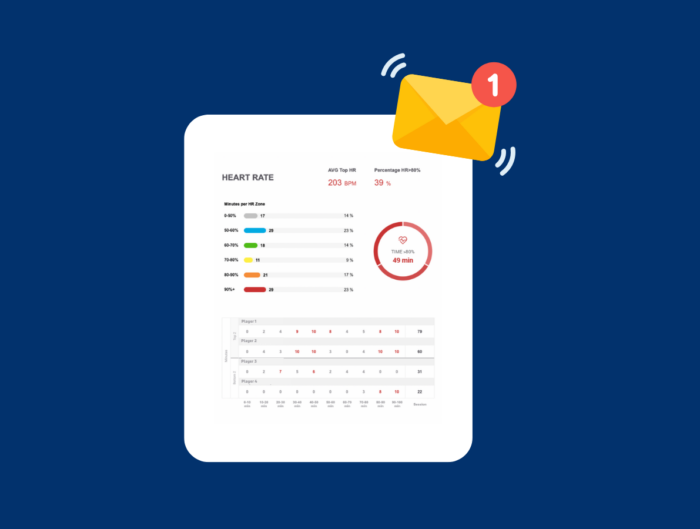In the world of sports, reflection is just as important as the actual game. Coaches need to analyze their performance and identify areas for improvement in order to achieve their goals. That’s where technology has become a game-changer, providing teams with the data and insights they need to make informed decisions for team development. To help coaches on match day, Beyond Pulse developed the Game Day Report feature, a report that empowers users of all levels with a simplified and streamlined approach to game day data analytics, sent straight to their mobile devices. 
The report includes our four main metrics, including active participation, workload, heart rate, and total distance covered, providing coaches with a comprehensive understanding of their players’ performance. With this information, teams can make informed decisions about player substitutions, tactical changes, and training regimes, ultimately improving their overall development.
The Game Day Report is divided into three sections, each designed to provide users with crucial information for post-game reflections.

SECTION ONE: Collective Team Data
Collective Team Data answers questions related to the overall performance of the team as a whole. This section provides a comparison of match data across the previous five games, allowing users to identify patterns and trends in the team’s performance.
Gain insight into questions like:
- How has the team’s performance changed over time?
- What are the strengths and weaknesses of the team as a whole?
- Which areas of the team’s performance need improvement?
- Are there any performance trends that need to be addressed?

SECTION TWO: Individual Player Data
Individual player data provides in-depth information on the performance of each player during a match. This information is based on each player’s minutes on the field, and any downtime like halftime or time off the pitch is taken into consideration. So, you’ll get a complete and accurate picture of how each player performed during the game.
Gain insight into questions like:
- How did each player perform during their minutes played?
- How active was each player during the match?
- What was the player’s workload during the game?
- What percentage of the game did the player spend in their Redzone?

SECTION THREE: Game Period Data
Game period data answers questions related to how a player’s performance changes over the course of the game. This section provides insights into the player’s performance at different stages of the game, such as the first half and second half. .
Gain insight into questions like:
- How does a player’s performance change over the course of the game?
- Are there signs of fatigue or improvement that can be detected during certain points in the game?
- Did a change in tactics affect the physical performance of the desired players? (ie. Playing through the flanks should see an increase in HR/Distance for those players).
- What changes in performance can be attributed to specific game periods?
As a coach, it’s crucial to have a data-driven and objective viewpoint on the performance of both players and the team in order to make informed choices on game day. The Game Day Report serves exactly that purpose. With the help of this information, coaches can obtain a more comprehensive understanding of their players and team, which enables them to make effective changes to their game strategy, training regimens, and other aspects of team growth!
Use your Game Day Report data to inform a periodized training plan.
Periodization is a method of organizing a team’s training program into specific phases or periods, with each period focusing on a different aspect of fitness.
By using the data from the Game Day Report, coaches can determine the areas where their team or individual players need to improve and then incorporate those needs into their periodization plan. For example, if a player’s performance on the field is lacking in a certain aspect such as speed or endurance, the coach can focus on improving that aspect during a specific phase of the team’s training program. By integrating the Game Day Report with periodization planning, coaches can ensure that their training program is effectively addressing the areas that need improvement, leading to a more well-rounded and holistic approach to player development.
Learn more about Periodization Planning from performance science expert, Steve Fell.

 FRA
FRA































